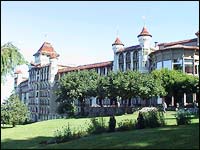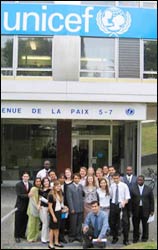I started blogging three years ago, and my blog has literally taken me places. I have met many interesting people online, one of them being Daniele -- a career coach and my online agony aunt -- from Paris.
She used to visit my blog regularly. We connected, she came to India and we met.
 She told me all about the Caux Scholars Programme, a peace and conflict management programme conducted in Caux (pronounced Co), a tiny village in the Swiss Alps.
She told me all about the Caux Scholars Programme, a peace and conflict management programme conducted in Caux (pronounced Co), a tiny village in the Swiss Alps.
I have always been interested in conflict management and worked on my application for six months before I finally got selected.
What is the Caux Scholars Programme?
This annual one month long study programme focuses on the moral and spiritual dimensions of peacemaking and on the relationship between individual transformation and change in the world.
Twenty youth from across the globe are selected based on their commitment to the community and the world, their academic credentials and their cultural background adding diversity to the global classroom.
This year, the group hailed from 14 different countries. The classroom was a melting pot of diversity, with scholars from US, Uganda, Nigeria, Kenya, South Africa, Mexico, Colombia, Germany, Cambodia, Nepal, Uzbekistan, Kyrgyzstan, Armenia, Australia and India.
The group comprised an eclectic bunch of people with diverse careers -- a young politician from Uganda who stood for parliamentary elections in his country, an American who had been writing a post-war novel in Croatia on a Fulbright scholarship, a Cambodian who was studying to be a lawyer, a Muslim girl who started a youth movement in post-apartheid South Africa, a Mexican who could speak six languages fluently, a Nigerian who had done internships in five different African countries, a Nepali studying medicine in China, a gospel singer studying government at Georgetown University and a girl from Minnesota who was a cross-country runner.
The course examines the personal, religious, social and cultural factors that create and sustain conflict, as well as how to deal with differences.
The venue
The Caux Palace, also known as the Mountain House, is used as the Initiatives of Change Conference Centre during the summer and a Swiss Hotel Management School for the rest of the year.
It was built in 1900 and was the biggest and most luxurious Swiss hotel back then and was frequented by writers, film stars and royalty. However, with the Great Depression in 1929, it was closed down.
It was later re-opened to house the Jewish refugees fleeing from Hungary in December 1944.
The Caux Palace has been a meeting place for adversaries and a venue for reconciliation since 1946, when it played a significant role in the Franco-German reconciliation during World War II.
A typical day in Caux
~ My day would start at 7 am with Quiet Time, when everyone sits in collective silence, listening to his or her 'inner voice'.
~ Post a typical European breakfast, we would listen to visiting faculty from different universities who specialise in various aspects of peace building.
~ After lunch, we were free to do community service. You could work in the kitchen; serve in the dining hall during meal times or work in the housekeeping, reception, travel office or gardening departments.
I had chosen gardening as my community service and spent my afternoons cutting roses, plucking ripe raspberries from the palace orchards or weeding the grass with an 86-year-old Caux inhabitant called Hildi, a sprightly lady who was young at heart and full of amazing stories. She knew the history of the Palace like the palm of her hand and would relate the stories of yore during the chilly afternoons.
~ After tea, we were free and would sometimes hike up the mountain.
~ Supper was a treat. That's when I got to meet people from different countries who are attending the various conferences, like the controversial Islamic scholar Dr Tariq Ramadan, an Islamic thinker based in Geneva, famous for being the grandson of Hasan al-Banna, founder of the Muslim Brotherhood in Egypt in 1928 and his liberal-radical views.
I will never forget a conversation I had over lunch with an old British soldier who fought in India in 1944 or an old woman from Norway of Pakistani origin, a politician in her younger days in Pakistan who was arrested during Zia-ul-Haq's regime there.
She later fled the country, got married in Norway and has been there since. She never had an e-mail address. I helped her open her first email account!
~ After supper, there would be a classical concert, a performance or a lecture in the main hall. And then, the party would begin. We would gather in the Caux Café and spend the rest of the night chatting in small groups or go up the mountains to light bonfires and tell tales from our respective countries. Music from Russia, card games from Latvia, tales from Sudan, Salsa dancing from Mexico and Egyptian belly dancing too -- all packed into the Caux Café till I trudged back to my room in the wee hours of the morning.
The challenge
Along with the excitement, there were also deadlines for assignments, papers, presentations, etc
Each of us had to do a presentation on 'Conflict From Where I Come From' -- a thorough analysis of a conflict from our communities or countries where we had a certain degree of personal experience and felt deeply connected to. The conflict had to be presented in all its complexities and this had to be prepared in advance, before we reached Caux.
In the few weeks I was there, I was educated on 19 different conflicts from 14 different regions of the world through these presentations. At the end of the programme, we had to submit a paper based in context with the conflict we had chosen to represent.
 We were taken to the United Nations and through a one-day familiarisation programme at the UNICEF.
We were taken to the United Nations and through a one-day familiarisation programme at the UNICEF.
I also spent many a weekend down in the town of Montreux, attending the world-famous Montreux Jazz Festival, a street jazz event. And others, swimming in the icy waters of Lake Geneve or simply walking through old villages soaked in history, in the mountains or better still cycling around the lakeside promenade.
Some of us also hiked up to the top of Roche de Naye (a mountain in the Alps) for the sunrise where you get to see the full moon setting in front of you, while behind you the sun breaks into its first gold rush.
While a classmate left for London (Germany, France and London are a hop, skip and jump away) on one of the weekends, I hitchhiked to Zurich and the capital city of Bern with a few other Caux scholars.
What I gained from the trip
Travel enriches the mind and this trip did the same for me. I visited so many countries by staying in one place through conversations with so many people from different cultures. Caux changed and challenged my perceptions and stereotypes of everything that matters to me. It made more space in my heart for the others -- their issues, their concerns and their experiences. I feel very rich.
The different experiences empowered me to deal with local issues on a global scale and to be able to understand global complexities in a microcosm. And of course, as a Caux Scholar, I can proudly say I have friends from almost all the continents.
How to apply for the Caux Scholars program
The programme is open to people who fit the following criteria:
~ You could be doing your graduation or have completed your graduation.
~ High academic achievement (transcripts required)
~ Demonstrated leadership ability
~ Prior foreign language study
~ Public or community service
~ Interest in ethical dimensions of world affairs
~ Openness to a multi-cultural experience
Fees: US $ 2,500*, which covers tuition, meals and lodging. A limited number of scholarships are also available.
* Subject to Change
Web site: www.cauxscholars.org
For more details, you e-mail me at alltough@gmail.com
Altaf, 24, is a media professional and has a keen interest in conflict management. He currently lives in Mumbai.
Have you travelled abroad for an student exchange/ fellowship/training programme? Share your experience with us.
Don't forget to include your name, contact details and what you do for a living.




